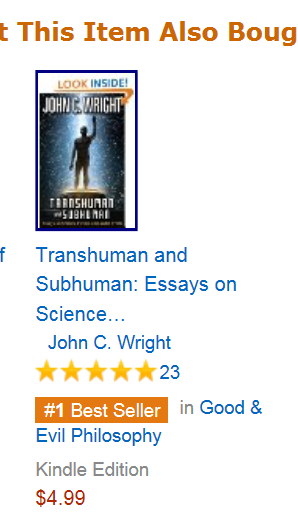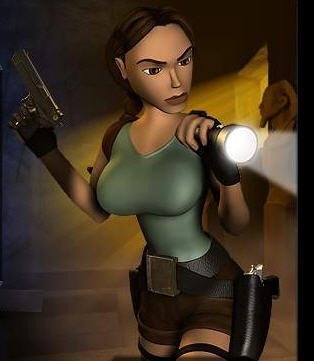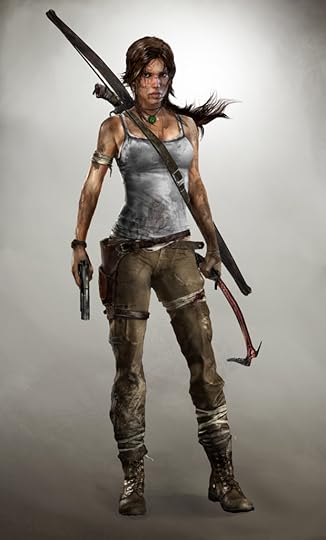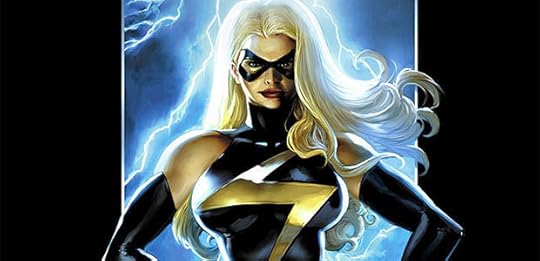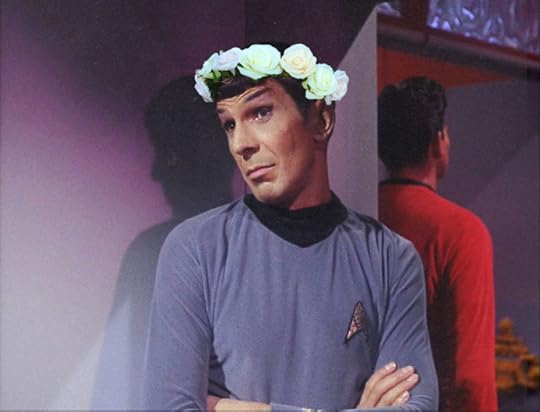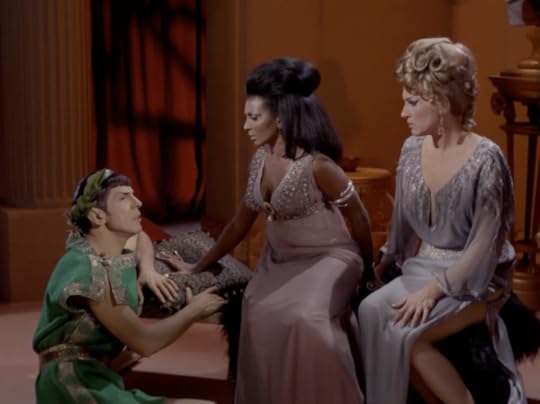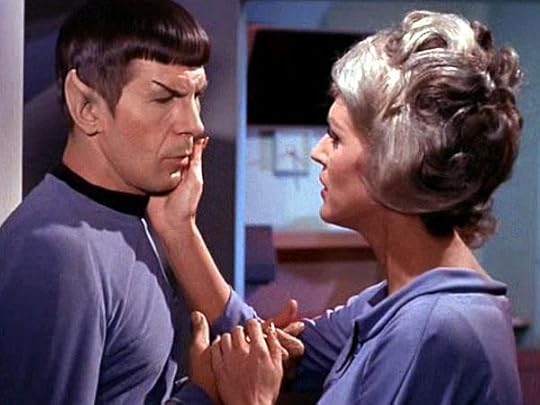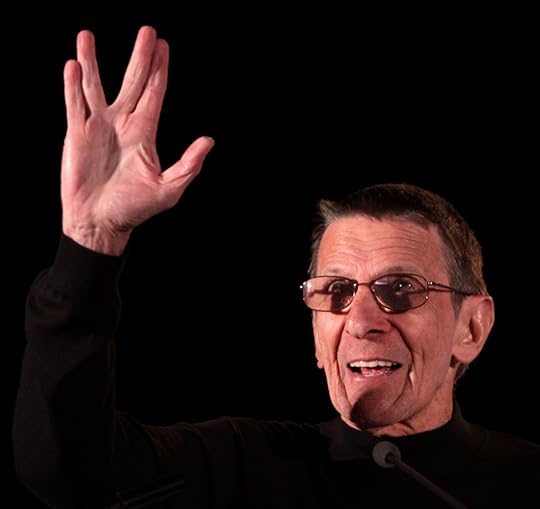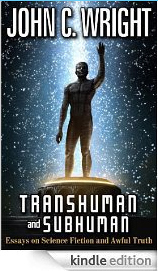L. Jagi Lamplighter's Blog, page 22
April 8, 2015
Superversive Blog: The Bosom-Jiggle Factor
Today, I thought I would do a post explaining the concept of the Needs of Drama vs. The Needs of Culture using visual aids.
Normally, I avoid things quite this tacky, but it is such a simple way to make the point. I hope my readers will for give me for the lapse.
(Originally, I thought of calling this post The Boob-Jiggle Factor Index, but I was reminded that my Facebook feed ends up in many people’s living rooms, where their kids are. Thus, the slightly less tacky title. For the rest of the post, I will use BJF, and you may decide, in your own imagination, whether the B stands for breast, boob, or bosom.)
So, to refresh, my theory is that there are two forces at work creating a story. The forces at work are:
The Needs of Drama—the qualities that make a story dramatic, eye-catching, intriguing. Sex, sizzle, bang, POW! Seduction! Explosions! LOTS OF CAPTIALS AND EXCAMATIONS!!!!!!
The Needs of Culture—the desire to use the story to teach lessons needed to participate in the culture, like an Asops Fable or a morality play. These stories include topics like: How to behave. How to treat friends. How to treat strangers. What is and is not moral. – the message of the work.
It is not my opinion that one of these forces is better than the other. Rather, I believe that there needs to be a harmonious marriage of the two of a work to be really great.
Too much drama leads to meaningless sex and bloodshed. Too much culture leads to boring message fiction.
Without further ado, The Needs of Drama vs. The Needs of Culture, as illustrated by the BJF Index:
The Needs of Drama:
(And we can’t even see the jiggle factor here.)
The Needs of Culture:
Here’s a comparison:
For the second one, we move to Ms. Marvel/Captain Marvel. For those who are unfamiliar with comics, all the pictures below are of the same character: Ms./Captain Marvel.
For this second one, I am only discussing the straight out physical appearance—things like elegance of form vs. difficult to draw but easier to cosplay—not the race, religion, or any other aspect of the character.
Just the BJF.
The Needs of Drama:
The Needs of Culture:
(I’ve seen some really cute cosplay costumes for this new Ms. Marvel outfit. Ironically, the real dresses look better than this drawing.)
An elegant mix of drama and culture, perhaps?
Any questions?
April 7, 2015
Kicking Puppies While They Are Down
This weekend, a lot of fans have acted in a disappointing, mob-mentality manner. Fans, I’m sorry to say, on both sides.
A lot of good authors received Hugo award nominations on Saturday…after hard work and the support of many fans.
But two people crying “The sky is falling! Gamergate is coming!” ruined it for a great many people.
The idea came into people’s heads that the Hugos had been hijacked and the nominations were illegitimate—people who did not bother looking into how the Sad Puppies campaign was run. (There was even a libelous—quickly retracted—Entertainment Weekly article based on some of this false information. EW had to issue a lengthy apology.)
Folks, it is true that more fans chose this year’s winners than any other year. But the difference between this year and last year was: 199.
Yep. 199 more fans signed up.
Not really an attack by the galloping hordes.
For this…199 new votes this year…people are calling to vote No Award, rather than read the works and pick the one you find the best.
What is this, folks? Elementary school?
So why did people say that Gamergate swung the vote?
Because one—note the word ONE—longtime fan is a Gamergate guy, too, and wrote a tweet calling on friends to support his favorite authors.
This gentleman, who goes by the name of Daddy Warpig, left this in the comments a post about the EW article:
Daddy Warpig commented on Entertainment Weekly guilty of libel?
BRAD: A letter I sent to the editors of Entertainment Weekly. To whom it may concern, I am writing to point out some …
As the shining, guilt-proving link between #GamerGate and Sad Puppies (according to Patrick Nielsen Hayden and followers):
1 – I only nominated works I read.
2 – I didn’t nominate Sad Puppies works I had read, because I didn’t believe they deserved it.
3 – I nominated other works I felt deserved it, which didn’t make it.
I’m glad I participated, and I’m looking forward to participating next year.
Also, I’m a nobody, who had nothing to do with Sad Puppies except sending out some tweets and joining Sasquan. PNH used my tweets to defame everyone in Sad Puppies. That’s despicable.
The people of Sad Puppies won a victory. #GamerGate had little or nothing to do with it.
Evidence: pic.twitter.com/ilZQ2x8LLu
Congrats, and good luck beating No Award!
For this, you kicked your friends when they were vulnerable?
And the Puppy fans, alas, were hardly better. For every Hugo nomination receiver I know who was attacked, I know an innocent Liberal fan who was ravaged by Puppy supporters.
Yesterday was a sad day for fluffy baby animals of all varieties.
April 4, 2015
The Wright Household blinks in awe
Today the Hugo nominations were announced.
John was nominated for SIX Hugos. This is an all time record.
We are stunned and humbled.
To those who voted, thank you!
April 3, 2015
First They Came For The Oscars: My Take On The Hugos.
With the Hugo Nominations being announced tomorrow, the topic of what is right or wrong with the award is quite popular right now.
I am going to take a step away from most of the discussion on this topic and say that I do not believe the issue is political.
Sure, at the moment, one group is on one side of the political spectrum and the other is on the other, but that is not the issue that is actually before us.
The issue is: Insular vs. Popular
Let me tell you a little about my background and why I believe this.
When I was young, I worked for my father. My father distributed movies to television. He would find public domain movies with expired copyrights (or no copyright, the laws were different then), find rental companies (reel–this was before tape) that had copies, and make these copies available to television stations to use for mid-afternoon and late night filler.
Doesn’t sound like much, but he put two kids through expensive colleges on that work.
My job, among other things, was to write catalogues. We did our catalogues along different themes: women’s movies, cowboy movies, scary movies, and—most importantly—Academy Award Winners.
Have you ever read the list of Oscar nominees for 1939? This was before they limited the number of nominations to five (which they seem to have moved away from again). It read:
o Gone With the Wind
o Dark Victory
o Goodbye, Mr. Chips
o Love Affair
o Mr. Smith Goes to Washington
o Ninotchka
o Of Mice and Men
o Stagecoach
o The Wizard of Oz
o Wuthering Heights
Can you imagine even half of those movies getting a nomination today? Do you think Gone With the Wind would still win? Would Mr. Smith Goes to Washington or even The Wizard of Oz still be listed?
Let me put this very clearly: Had this been 1939, everyone’s favorite movie of 2014 would have at least received a nomination, if not actually won—instead of receiving nominations for things like Make-Up and Visual Effects and losing to a move called Birdman (The Unexpected Virtue of Ignorance)—which I had never heard of until I looked it up. (This does not mean it is not a good movie…but it sure as Sundays means it’s not a popular movie.)
I am speaking, of course, of Guardians of the Galaxy.
(Okay, disclaimer Guardians of the Galaxy, much as I absolutely loved it, was not my favorite movie of 2015. That distinction falls to my new top favorite movie, Winter’s Tale, which really did deserve an award, but instead was watched by six guys, one whom wandered into the theatre by mistake, a tree, and me. But I digress.)
Oh, come on! You are thinking, a movie like Guardians of the Galaxy would never win best picture!
To which I say: Exactly!
What is the point of a Best Picture award that has nothing to do with the best picture of the year?
Really, the Oscar award should be called Top Artsy Film.
What happened to the award that used to go to movies like It Happened One Night and Gigi? My Fair Lady and The Sound of Music?
Can you imagine those movies winning today?
When did it become “Award for the snobbiest movie of the year?”
Okay, that’s not entirely fair, good movies do occasionally win, but, imho, the best movies of the year haven’t won in years. And it seems to have gotten worse in the last decade.
Why is this?
Is it a secret conspiracy? An evil plot? Demons?
Possibly demons, but I don’t think so.
I think it is a natural process that I will call saturation.
The Academy Awards are voted on by…the Academy For Motion Picture Arts and Sciences. These are serious professionals who care about the business. This means they watch LOTS of movies.
Lots. Scads, even.
And, like reviewers, who often pan movies audiences love, they begin to put a higher and higher value on originality.
Because they’ve seen it before. They want something new.
Also, they like things that are creative because they build on other things, things only they have seen. This movie harkens back in a clever way to one from fifty years ago. That impresses someone who has seen both movies.
It doesn’t do jack for the public.
So, the insular quality of the voting audience has, over the years, made the Oscars go from topical to trivial.
And good movies go by unnoticed and unremarked upon…except in the box office.
(Unless they are the best movie of the year, which only got viewed by six folks, a tree, and me. But I digress.)
So…what about the Hugos?
Same thing happened.
Hugos used to go to the big, commercially successful books everyone loved. (Like The Martian. I think we all agree…on both sides of the great Hugo divide…that The Martian would have deserved the Best Novel award this year, had it been eligible.)
And they voted for books on both sides of the political spetrum, as evidenced as the winners for 1960 ad 1962:
1960 Starship Stormtroopers by Robert Heinlein
1962 Stranger In A Strange Bed by Robert Heinlein
See? Both sides represented. ;-P
There were winners people still love today, such as Dune and Lord of Light. And winners that, nowadays, I alone still remember and like, such as And Call Me Conrad (This Immortal).
But back then, there was a regular corollary between the books that won and the books that were selling to general fandom.
Nowadays, the Hugos seem to have gone the way of the Academy Awards—being awarded by a relatively small group of fans who have read it all. So they look for very different things in a book than the general reading public.
There is nothing wrong with this.
(Brief side note: people I have spoken to disagree on the merits of last year’s winner. I have not read it. It could be terrific. But I note that while a few people say they actually liked the book, most seem to like it because it got rid of he and she. In particular, because they thought this was some step kind of forward in women’s rights.
Folks, the Chinese language does not have he and she…and it hasn’t exactly opened their eyes on the matter of equal rights for the sexes. Okay, back to our main programming.)
But a vote from a small crowd of fans is not the same as a vote from a large one.
So lets look at two things in particular: Larry Correia and Redshirts.
Larry Correia.
Never mind what you think of his politics, Larry Correia SELLS! (He puts more aside in one quarter of the year for estimated taxes than quite a few authors I know have made in their entire writing career. )
What’s more, people LOVE his stuff.
Teenage girls, school teachers, librarians, technical writers, erudite psychiatrists. What do they all have in common? They are all reading Hard Magic or the Monster Hunter books.
The excitement about Correia among fans reminds me of George. R. R. Martin about ten or fifteen years ago, when his third book had come out and not all that many people had heard of him, but if you had, oh my, did you go crazy with book love when you discovered that your neighbor who you ran into at the school bus stop was also a fan of Game of Thrones. Or Butcher. Even today, diverse fans across the spectrum light up at the mention of Harry Dresden.
That’s the kind of excitement Correia’s books are garnering.
Are his books the best written this year?
Maybe, maybe not. But I enjoyed Hard Magic tremendously, and if a book like that won an award, I would not thing the award ill served.
Even if there are better books out there, a pertinent, up-to-date award would at least give Correia and Butcher a nod…because the same fans who lay down their dollars so enthusiastically for these gentlemen’s books would tend to suggest them.
But before the last two years, these authors were not even getting suggested—because fans in general were no longer voting for the award.
Many fans I know don’t even know the Hugos exist. Which is a crime. If not for the present and the future, the dignity and name of the Hugos should be more widely known so as to encourage new fans to seek out the excellent winners of yester year.
Second case: Redshirts.
I have not read Redshirts, but I have heard a lot of flack about it getting an award. But I am not entirely sure the flack is merited. Here’s why:
I recently had lunch with a writer friend. While chatting over lunch, she mentioned that when she wants to share SF with someone who has never read it, she always recommends Scalzi, Old Man’s War, in particular. It was a great book, she explained, for introducing those dignified fellows at work to the world of science fiction.
And I realized that she was right. The very complaints I had heard about Old Man’s War, that it was derivative of earlier science fiction works, becomes a virtue if you want to introduce someone to the very ideas that those older books represented without overwhelming the person.
I am reminded of Eragon. A friend said he never read it because he was told, “Don’t bother. You’ve already read all those books” ( i.e. the books it was derived from. )
But my eldest son LOVED it. He’d never read the many things it borrowed from.
The story was new to him.
So, did Redshirts win its Hugo on its merits?
Probably not. Throughout time immemorial, works often win based on how much readers liked the author’s previous works. So, it was partially due to reader’s admiration for Old Man’s War that Redshirts got its nomination…a book, as we have just learned, that is useful for lowering the heavy investment cost sometimes involved with entering our beloved field.
Any writer who helps draw in new fans deserves a Hugo nod.
But Redshirts had something else going for it as well. Nostalgia. So many of us came into fandom through Star Trek. A book nod to the power of Star Trek delights us even as Galaxy Quest delighted us. (Hey, it really wasn’t a great movie…but who can resist being amused by it.)
Now, you can argue that Redshirts getting an award for nostalgic reasons is a blow against the Hugos because it is like the Academy voting for movies that have in-references to other movies.
Or you can argue that it is a win for the Hugos, because the book really did have a broad fan appeal—to the many, many fans who so love Star Trek.
I’m not going to take sides on that. For the point of this article, it doesn’t matter.
But if Redshirts had won with 30,000 fans voting or 100,000 fans voting, the answer would be much more clear than the current situation, where the Hugo was awarded by the 6,060 people voting at World Con 2013. (No slight against these good folks, mind you! They went and voted! It’s our own fault, if the rest of us don’t up and participate!)
There was a recent much copied quote about the Hugos belonging to a small group of people.
This should not be.
Science fiction already has an Academy-like award presented by field professionals. It’s called the Nebulas. The Hugos were supposed to be the popular vote.
The question is: How can it become popular again?
April 1, 2015
Superversive Blog: When Originality Is a Bad Thing
Today we have a guest post from author Suzannah Rowntree. She speaks on a subject near and dear to my heart. I am a big believer in creativity in our writing…but I find that a lot of calls for originality in form and writing are like telling an artist that they cannot use perspective in their work…and then wondering why the final painting looks weird.
When Originality Is a Bad Thing
by Suzannah Rowntree
Originality. It’s one of the sacred cows of contemporary art and storytelling. As it appears, a successful attempt at originality is one of our most important measuring-sticks of artistic worth, while nothing kills an author’s confidence or an audience’s enthusiasm faster than being told your work is unoriginal.
Instead, we’re led to believe, the only art worth its salt is art that adds something to the world, art that does something new and unexpected. So we live for the genre-busting novel, the shocking plot twist, the authors who demonstrate their artistic independence and fearless vision by desecrating temples and killing heroes.
The central demand is one for novelty. We expect to be surprised. We expect something we’ve never seen before.
And I’ve come to believe that this hankering for originality is a bad thing.
Now I don’t mean to argue for artistic laziness. I happen to believe there’s a huge scope for surprise, plot twists, diversity, and high artistic quality in unoriginality. But we have come to the place where our desire for innovation has morphed into a destructive monster. This is apparent in all the arts. A few years ago I read a really quite hilarious article from no less honoured a pulpit than the Huffington Post, bewailing the decline in Beethoven’s popularity over the last one or two centuries. When Beethoven’s music first made its appearance, performances were packed. Everyone raved about how transgressive the music was, its daring use of discord overturning what had gone before. Today, Beethoven concerts are snoozefests. What, the Huffington Post asked with apparently sincere puzzlement, had happened?
But isn’t the answer obvious? Someone came along who was more transgressive than Beethoven. By easy steps, we came to twelve-tone music on one hand, and Freddie Mercury on the other, and the currency of shock value was debased to the point where it took three minutes of John Cage listening to the audience’s shuffling to really sell out a concert.
Contrast that with one of the few remaining bastions of unoriginality in modern-day storytelling: the romance novel. The genre recipe is quite simple: there must be a hero and a heroine, and they must fall in love and live happily ever after. No one picks up a romance novel because they want to be surprised by a twist ending. In fact, the guaranteed destination is the whole point. There may certainly be twists and turns during the journey, we may certainly wonder how the mess of misunderstandings, grudges, and stubbornnesses keeping the hero and heroine apart will ever be resolved, but we are never really in doubt that at the end of it all, evil will be punished, good will be rewarded, and the prince and princess will ride off to live happily ever after.
Now a foregone conclusion is not something our culture generally rewards with high artistic accolades. Who is the most highly-acclaimed popular fantasy author of our age? George RR Martin, whose reputation is largely built upon his allergies to traditional heroism. A dedicated subversive writer, Martin kills off his most overtly heroic characters when his audience least expects it, sours his most idealistic characters, and enjoys the challenge of making his downright villainous characters sympathetic.
Martin is no doubt good at what he does, but for the superversive author, a different paradigm is necessary. A superversive story may be dark and even disturbing (CS Lewis’s That Hideous Strength comes to mind) but the evil is always evil, not misunderstood, and the good is always heroic, not tragically naïve. A superversive story may be in some sense original; it may surprise, delight, and astound its audience, but its currency is not ultimately shock value or novelty. Rather, its currency might better be described, in Lewis’s words, as Stock Responses.
If you’ve read CS Lewis’s essay The Abolition of Man, you know what I mean. If you’ve never read that essay, do get yourself a copy. In that work Lewis slams modern education as a sham and a farce that produces well-trained but morally incompetent men, “men without chests.” His novel That Hideous Strength dramatises this essay in the character of Mark Studdock, of whom it is said that “in Mark’s mind hardly one rag of noble thought, either Christian or Pagan, had a secure lodging. His education had been neither scientific nor classical—merely ‘Modern’… and the first hint of a real threat to his bodily life knocked him sprawling.”
The solution, in Lewis’s view, was the right kind of training, especially the right kind of storytelling. Fed on the right kind of stories, Lewis insisted, men and women might eventually be trained in the “noble thought” which alone is able to firmly ground them in virtue. To one trained in stock responses, beauty is seen in the clearly beautiful, nobility in the clearly noble, truth in the clearly truthful: Lewis saw himself, in his own words, as:
One whose doom
Keeps him forever in the list of dunces,
Compelled to live on stock responses,
Making the poor best that I can
Of dull things . . . peacocks, honey, the Great Wall, Aldebaran,
Silver weirs, new-cut grass, wave on the beach, hard gem,
The shapes of horse and woman, Athens, Troy, Jerusalem.
The temptation is to view these as “dull things”—trite, cliched, and shallow. We feel that it is so easy to see beauty in an obviously beautiful thing that in order to be truly original we must see ugliness there instead, and beauty in ugliness. But for the superversive writer, the challenge is quite different. We now live in a society which can no longer see the beauty in peacocks, the humility in faith, or (dare I say it) the peace and justice of traditional Christian patriarchy. The challenge is to reawaken our audiences to these things which they have forgotten how to see.
But to do this, first we must reawaken ourselves. It is not easy, once we have accepted the rule of originality and novelty, to reconcile ourselves with the need—the desperate need—for fiction firmly grounded in stock responses. Theme, characters, setting, and plot—none of these need to be new, just so long as they’re good. Personally, I’ve often felt slightly ashamed of my own novel, Pendragon’s Heir, a retelling of Arthurian legend. Wasn’t I just writing fan-fiction? But unoriginality has a long tradition in Western Civilisation, and if I was unoriginal, I was in noble company: Thomas Malory, Chretien de Troyes, even William Shakespeare and John Milton wrote their most famous works on an old and familiar theme. And because they wrote on eternal themes, they will be eternally relevant.
Since he is the one who codified my thoughts on the subject, I’ll finish with one last CS Lewis quote.
No man who bothers about originality will ever be original: whereas if you simply try to tell the truth, without caring twopence how often it has been told before, you will, nine times out of ten, become original without ever having noticed it.
Tell the truth without caring how often it has been told before: for me, that is the one overriding purpose and aim of storytelling, one of the major battle-lines between the subversive and what I’ve come to call the superversive. For Pendragon’s Heir, my challenge was all the more exciting for its lack of originality: to take an old story with familiar characters, and tell it anew for a new generation. Did I succeed? You’ll have to read it and tell me.
Read Suzannah's new book: Pendragon's Heir
Ebook version: http://www.smashwords.com/books/view/530467
Author bio:
When Suzannah Rowntree isn’t travelling the world to help out friends in need, she lives in a big house in rural Australia with her awesome parents and siblings, trying to beat her previous number-of-books-read-in-a-year record. She blogs the results at www.vintagenovels.com and is the author of both fiction and non-fiction. Pendragon’s Heir, her debut novel, released March 26 on Kindle and in paperback.
Pendragon’s Heir synopsis:
Blanche Pendragon enjoys her undemanding life as the ward of an eccentric nobleman in 1900 England. It's been years since she wondered what happened to her long lost parents, but then a gift on the night of her eighteenth birthday reveals a heritage more dangerous and awe-inspiring than she ever dreamed of—or wanted. Soon Blanche is flung into a world of wayfaring immortals, daring knights, and deadly combats, with a murderous witch-queen on her trail and the future of a kingdom at stake. As the legendary King Arthur Pendragon and his warriors face enemies without and treachery within, Blanche discovers a secret that could destroy the whole realm of Logres. Even if the kingdom could be saved, is she the one to do it? Or is someone else the Pendragon's Heir?
March 27, 2015
I Heart Spock – my meandering reminiscence of my life-long love affair with a certain Superversive Vulcan
History has overlooked one of my favorite Star Trek characters. You never hear her name any more, even though you hear Uhura all the time. But no one ever mentions Nurse Chapel, but I loved Nurse Chapel as a girl.
Because she loved Spock.
The thought of the unrequited love that this fine young woman (played by Roddenberry’s wife, Majel Barrett, who was also the voice of the ship’s computer) held for the calm, logical Mr. Spock delighted my teenage heart. Especially in the Amok Time episode, where she looked so hopeful when he suddenly got emotional.
I felt so sorry for her.
(Amusing note: Until this very day, I had always thought it was called Amuck Time…meaning the time when Vulcans’ emotions went amuck. )
I loved Spock, too. And like Nurse Chapel, I longed to have a chance to draw his attention. But even more than that, I wanted to be Spock.
The first step to being Spock was to look like Spock.
I was a slender girl with long hair, so that did limit my ability to look like him…a bit. Other than that, though, you would think a Star Trek uniform would be relatively easy. Blue shirt. Black pants. Gold braid.
But no. My parents felt that was not done for girls to wear black pants. Apparently, this was a thing back then, thinking that only mature women were allowed to wear something that scandalous. So, no black pants.
However, I did cut my black bangs straight across my forehead. And I wore a blue sweatshirt that Mom and I had sewed gold braid onto the sleeves there-of.
I remember the one time I got to borrow a pair of black slacks and wear them with my blue shirt. I felt so Spock-like walking down the road.
But the real kicker for me was not the lack of black pants, it was that I can’t raise just one eyebrow. My mom can do. And I worked at it and worked at it…to no avail. When one brow goes up, so does the other.
Truly a sad thing.
(My favorite Jim Butcher line is still: He spocked an eyebrow.)
But I did not love Spock simply for his outfit or even his eyebrow. I loved him for his Superversiveness.
How was Spock superversive, you ask? Spock was the single impressive symbol of self-control in an age that celebrated indulgence.
Everything in our modern culture screams self-indulgence. Do drugs. Have sex. Let it all hang out. Scream and shout in public like sit-com characters—only now real people act that way, too. Do it your way. Don’t repress. Drink. Smoke. Life is a party. And anyone who says otherwise is a Victorian. A prude. A symbol of ridicule.
But not Spock.
He was the champion of logic. He was the Knight of Science. Kids could admire him and his reserved ways without anyone associating them with the Old Guard of the previous culture, who were so despised.
To quote Spoke himself, he was “fascinating.”
I read an article after Leonard Nimoy’s death raising Data for wanting to be human and condemning Spock for struggling not to be human. I could not disagree more. I loved Data, but he was trying to achieve something we already have, because he suffered from a lack of humanity.
Spock was not like that. He had plenty of humanity, but he tried to resist the worst of it. The fact that he occasionally failed was one of the things that made him so utterly delightful.
Or should I say fascinating?
Spoke was delightful in a way that the other Vulcans in Star Trek never quite achieved. Some of them were cool or fun to watch. But none of them had that magical twinkle nor the drama that came from the battle of two natures.
That battle of two natures was a familiar one to teenage me. As an overly-emotional teenager living in an overly-emotional environment, I could have used a lot more Spock-like qualities in my environment.
And I knew it.
I wanted to be like Spock partially because I so obviously wasn’t.
I was around ten when we first found Star Trek. My brother and I discovered it through the Saturday Morning cartoon, which I still love. They were terrific.
The involvement of Star Trek in my life went beyond just watching. My father distributed television programs, and for one short time, he was distributing some Star Trek episodes. I worked for him. Ordinarily, I made $2 an hour (not a bad wage back then for a teen). But because he considered me an expert, when I did work on Star Trek for him, I got paid $10.
It was Heaven.
My father believed in fresh air and used to send us outside for much of the day. One summer, we kind of tricked him. We figures out how to turn the space under the front stairs into a fort…so we could sit around even though we were outside.
All summer we played Star Trek. I was Spock. My brother was Sulu. My cousin Ariel was Kirk. Our story involved the crew as kids. Their parents all had the exact position they later had, while Kirk, Spock, etc. snuck around through the ship using secret passages the adults either didn’t know about or couldn’t fit through. (There was also a sister ship that had an equal and opposite compliment of crew of the opposite sex, so that everyone would have someone to marry. The only one I still remember was the brash female captain counterpart for Kirk, whose name was Cindy.)
That version, where all the crew were young, yet still living on the ship together reminds me obscurely of the new movies…where the whole crew ends up together when they are barely out of college, instead of after much life experience.
Just before Leonard Nimoy died, I had a conversation on Facebook with friends about whether or not the new movies undercut much of Spock’s appeal when they gave him a girl friend. Sure, it was shocking when we first found out, but once the initial surprise was over…did it take away from the character that he was no longer the tremendously aloof?
Different friends had different takes on this subject. But I feel that a lot of the mystery was gone. There isn’t nearly as much draw to try and figure out how to win the heart of a guy someone else has already won. (Not to mention that we didn’t even get to see how she did it! Really, a romance that won Spock’s heart should have been onstage. )
Also, I love Uhura as much as the next gal. I’ve played her in roleplaying games. But…it should have been Nurse Chapel.
I mean, after all these years of waiting!
So I wanted to write this to remember Spock and to remember Leonard Nimoy, the man who brought him to life with such wit and…dare I say it?…humanity.
PS. I never did get to be Spock, but I did get to marry the most logical, Spock-like gentleman I have ever had the honor to meet. (Nowadays, my husband is more Chestertonian, but when we were in college, he was very, very Spock-like. )
Which goes to show: way back when, when I watched those early Star Trek shows and I felt in my soul that I really could be the one to melt Spock’s cold Vulcan heart—I was right.
Click here to see my favorite commercial—staring Old Spock and New Spock.
March 17, 2015
Signal Boost Tuesday: Operation Renfield is complete!!!
At last, Operation Renfield by Steven Johnson is complete!
Here is another snippit!
Franz had heard the mine explode, of course. But mines exploded fairly often on the Line. He couldn’t know for sure we were coming in force. Did he have a reserve handy? Was he willing to send it out after one mine, when something else might be coming in a little more carefully somewhere else? Unless both answers were yes, we still had a chance.
Maybe it’s mirror-imaging, but I figured if I were the Strudels, I’d send a recon patrol to see what’s what. Not that mirror-imaging is something vampires are very good at.
Brenner emerged from the background a few steps away. The spatter-colored smock he wore made him blend into the woods better than our foliage-studded camo nets did, and he knew how to move silently. You pick it up after a month or so in the woods; heck, I’m from Woodlawn in the Bronx, and even I got to sliding like a shadow over the snow eventually.
Dave was crunching determinedly through the snow, because where I balanced on the crust, he crashed right through. It was up to his waist, and had to be hard slogging, but he didn’t complain. His face was cycling through some pretty vile exclamations, but he didn’t make a sound. We could always hope that any mind-reader searching for us might be struck blind with disgust, or admiration for his vocabulary.
Moving a platoon quietly is basically impossible.
Someone’s always gonna sneeze, or snap a branch, or crunch snow under his clodhoppers.
What, you’re waiting for the but? There isn’t one. Moving a platoon quietly is nearly impossible.
With enough prep, though, we might not be loud enough to get intercepted. Selection’s important when you can; most of King Company were picked men, although sometimes we got handed replacements and told to make do. That tended to even itself out, because the ones with a natural gift for sneakery prospered, and the others got wounded.
Once you got selection, you need training. In some ways the Army’s all about training. It never stops, or it shouldn’t. A guy had to practically out-stealth the Shadow before we’d let him go on leave. Again, sometimes an officer had other ideas, and sent a man away whose skills were gonna rot before he got back. But you have to have officers in an Army, don’t you?
Don’t you?
I was chewing on that when a tree wobbled in my line of vision.
I stopped still – yes, it was moving even when I wasn’t. I held up my right fist, shoulder-high. The woods got quiet.
Rattling leaves – there was still plant life up here – pinpointed the exact tree that was moving. I slipped my helmet back, uncovering my ears, but also raising my sight line above my brow. I couldn’t see a thing up there.
Something moved beside me. Dave was blinking his eyes, slowly, but steadily. He had big eyes, so when they went from white to dark it caught my attention.
I’d made the sign to freeze, so he wasn’t moving. In combat, or what could become combat at any moment, he wouldn’t dream of ignoring my orders the way he sometimes did in the rear. Obedience, even deference, served a purpose up front.
But he was blinking to get my attention. There wasn’t much of a moon, and that screened by the trees, so it wasn’t a huge risk, but even so, he thought he needed my attention bad enough to take that chance.
I cut my own eyes around. I didn’t see Brenner, but two of my own guys were staring at that tree as hard as I was. I sort of raised an eyebrow, asking the question with my eyes, but they didn’t see anything either.
The tree stopped shaking.
I could swear it was leaning at a different angle now. But it didn’t look bent. I was stumped, so to speak.
Nothing for it. I slowly slid to the ground, merging with a shadow, then crawled on my belly over to Dave. My elbows found every rock on that slope, dragging my weight along.
When I got close, he shuffled over to my ear.
“Dwarves,” he hissed. “Under the roots.”
Planting a mine? Digging a tunnel? Or just waiting to topple the tree onto us?
I eased a grenade out of my bandolier. Silver twinkled on the casing where the lampblack had rubbed off. It was meant for vampires, but nobody really likes fragments of jagged metal in their bodies.
Besides, the loss of shine discipline might be turned into a bonus. I held the grenade up near my helmet, turning it to catch the moonlight. Soon other twinkles flickered about the forest floor. My guys were prepping their own grenades.
As soon as that dirt-eater stuck his snout above Terra Firma, we were fixing to blow him right back to Heck.
Dave snugged the Browning Automatic Rifle into his shoulder. We always had the short guy carry the heaviest weapon. If that sounds cruel to you, just look at it this way. Most guys who get hit are hit by unaimed fire, usually artillery, but sometimes just a guy popping a few shots around a tree. Now who is more likely to get hit by random chance: a big man or a small man? Exactly.
If we coulda measured who was the luckiest guy in the outfit, you can bet he’d carry the big gun. But since we can’t, no matter what the Christian Mysticists say, it goes by inches and pounds.
Dwarves are dense. A bullet that would kill me or you wouldn’t usually knock them down. Oh, they might bleed out after a while, but they could raise all kinds of Heck in the meantime. To put them down reliably, you needed a big, heavy bullet, heavier than the thirty-ought-six our Garands threw. Or, if you didn’t have that, you needed a whole lot of thirty-ought-sixes, all at once. Hence the BAR.
Or you could think of the BAR as the smallest, simplest machine gun one man could use by himself. Dave was supposed to have an assistant to change magazines and carry ammo, but they kept dying and we kept accumulating more BARs. So he was pretty much his own assistant.
A wink of metal appeared in the dirt next to the tree. Dave lined up the BAR on it and waited for my word. I withheld it, waiting for the dwarf to show more of himself above the soil. It doesn’t take much dirt to stop shrapnel, most of the time.
The dwarf shoved something up into the moonlight and I tensed. It was a thin-bottomed triangle, the color of dirt, of course, but then the bottom came free on a long, thin stick. The triangle hung there until the dwarf, still invisible under the sod, shook it back and forth. Then it flopped free. Parts of it weren’t precisely the color of dirt.
I let out a breath I hadn’t known I was holding. I lowered the grenade, a little.
“Let’s go meet the man, Dave,” I said louder than before. “He’s doing his best to fly us a white flag.
And the full story is now live!
Kindle:
http://www.amazon.com/Operation-Renfield-Steven-Johnson-ebook/dp/B00UCFYMV6
Paperback:
http://www.amazon.com/Operation-Renfield-Steven-G-Johnson/dp/1508734593
March 12, 2015
The Offenders, vol. 1: Secret Origins
In case any of you ever wondered what the writing of a Wright offspring might be like, here is an excerpt from the Elf King's write up for what we at the Wright Household call "Steve Johnson's Non-existant Next Mystery Man Game, or "The Nonexistant Game" for short.
This is the part of the origin story for Squir-El, Squirrel of Krypton!
The Offenders vol.1:
Secret Origins!
On a TV in a farmhouse somewhere in Champion City, a news report is playing, a news report that could change the fate of the world…and the moon!
“Hello, I’m Lois Lie of the TV division of the Daily Fib. Today, I am on the moon to introduce Neo Champion City, the city with a spacesuit, of the 61st State, Space Delaware. This is the 7th city of Space Delaware, other cities include Old Zealand, Space Brooklyn, Et Desertum, and Spaceland. Neo Champion City was created in case something happed to Champion City, like what has happed in the past, 5 times. President Norcross had this to say, ‘If you like your city, you can keep your city.’
“And normally I would believe him. but Champion City has so much super crime that all The Daily Champion super reposts is crime, and it don’t even get to all the superpowered menaces. Chief justice, world’s most Focused hero had this to say…”
“’World’s most Focused hero’ yeah right,” thought Slark Sent, mild mannered squirrel “I’m pretty Focused, too… Hay it’s a walnut, I should go bury it. Wait, something else was buried, Professor Menace’s lab! Professor Menace has his brain in a jar. Brain, like Brainiac, he has a force field, like Sue Storm, like Johnny Storm, like fire, like ice, like the North Pole, like Santa Clause, like cookies!” Slark gasped. “I’m hungry!”
Then Slark walked to the kitchen and got a bag of walnut that Ma and Pa Sent (the humans who took Slark in and raised him as a pet/son) kept in a cabinet for Slark when he concluded that he was hungry. But he forgot that he was hungry and started trying to bury the walnuts. But he then remembered Professor Menace and again came to the conclusion of cookies and ate a walnut.
By the time Slark finally meandered into the living room (where the TV was) the report on Neo Champion City was ending and a new report was beginning. “Hello, I am Boris Von Gloryhound of the TV division of the Daily Fib,” said the anchor of channel –42 (also know as the News Channel, All Lies All The Time) “And there’s a new hero in the city and his name is: Sir Spoonsalot!”
Well, as you can’t guess, Slark was furious!
March 11, 2015
Superversive Blog: Your Book of Gold by John C. Wright
I want to write a brief post about why I love Spock, but many snow days have severely decreased my productivity. So that will have to be for next week. In the meantime, I have been meaning for some time to post John's Book of Gold essay as part of our Superversive Blog.
John C. Wright writes:
A guy with the vunderbar name of VunderGuy takes a frustrated pen in hand and writes:
Even great authors like you, Vox Day, and Larry are relatively obscure, so what’s a chump like me to do to have an impact, ESPECIALLY as a writer?
All Saint Veronica did was wipe the face of Christ with a cloth as He was being led off to crucifixion, a single moment of compassion and pity. And she was granted sainthood for the act.
If you only write one book in your whole life, and only sell 600 copies or less, nonetheless, I assure you, I solemnly assure you, that this book will be someone’s absolutely favorite book of all time, and it will come to him on some dark day and give him sunlight, and open his eyes and fill his heart and make him see things in life even you never suspected, and will be his most precious tale, and it will live in his heart like the Book of Gold.
Let me give you three examples to support my point: VOYAGE TO ARCTURUS by David Lindsay had perhaps more effect and influence on me in my youth than any other book aside from WORLD OF NULL-A by A.E. van Vogt. To be fair, I misinterpreted both books, and took them to be preaching a resolute form of scientific Stoicism, an absolute devotion to sanity and truth which I doubt either author would recognize. I never wrote Mr. van Vogt a fan letter, despite that my whole life was influenced by him (but I did write a novel to honor him). Had it not been for his books, I never would have studied philosophy in High School, never would have gone to Saint John’s in Annapolis, never would have read the Great Books. I never would have met my wife.
As for Mr. Lindsay, he sold less than 600 copies of his book, and died in poverty, ignored and forgotten, of an abscess in a tooth any competent dentist could have pulled. And this is a book luminaries such as Colin Wilson, C.S. Lewis, and Harold Bloom regard as seminal. Mr. Wilson called it the greatest novel of the Twentieth Century.
The third example is my own. I wrote a short story called AWAKE IN THE NIGHT for the website of Andy Robertson, and was paid enough to buy a new stove. People have written me to say that this tale inspired dreams and nightmares, inspired new resolve, inspired hope, and at least one woman who was in the midst of her most wretched hour of despair, said she found strength just from the one description of a star appearing through the darkest clouds. What these readers see in my work is far beyond what I have the power to put down on the page: the hand of heaven touched that work, and those readers who express awe are seeing not the author’s hand, but the hand of the Creator who is author of us all, who guided the work without my knowledge.
I was luckier than Mr Lindsay in that I have gotten the letters and applause from admirers denied him, but like him, I have no idea of what future generations, if any, will read and admire my work. I will never know. It is beyond my event horizon. So that is not why writers write.
I write for that one reader I will never see, the one who needs just such a tale as I can pen, in just such a time and place, some rainy afternoon or dark hour, when providence will bring my book into his hands. And he will open it, and it will not be a book, but a casement, from which he will glimpse the needed vision his soul requires of a world larger than our own, or a star in a heaven wider and higher than ours, a star aflame with magic more majestic than any star mortal astronomers can name.
I humbly but strongly suggest you write for that unknown reader also, and not for worldly praise, or influence, or pelf, or applause. The world flatters popular authors, and the clamor of the multitude of brazen tongues is vanity. It is dust on the wind. The unknown reader will greet your work with love. It is a crown of adamant, solid and enduring.
You will never meet that one reader, not in this life. In heaven he will come to you and fall on his face and anoint your feet with tears of gratitude, and you will stand astonished and humbled, having never suspected.
March 5, 2015
Last Sad Puppies Book Bomb for This Hugo Year!
This comes from the keyboard of Larry Correia:
( Book by John below)
BOOK BOMB!
This is our last Sad Puppies 3 Book Bomb. Remember, you’ve only got a few more days to get your nominations in for the Hugo awards.
If you are just joining us, a Book Bomb is where we get as many people as possible to get a book on Amazon on the same day, in order to spike the sales rating as high as possible, so that it will end up on some bestseller lists and show up in front of all new readers who wouldn’t normally see it. Success breeds success, and the author gets new fans.
The Sad Puppies bombs are special because these are the works in the different categories that the Evil Legion of Evil has put forth as suggestions for our Hugo nomination slate. The last two we did went amazing.
Note, not all of these are available on Amazon. If that is the case then we put a link to where you can get it, or something else, so that the author can GET PAID. :)
**Best Related Work**
This is one of those weird little catch all categories that is often dominated by some really cliquish nonsense. We’ve got some big brain essays, hard science, philosophy, military strategy, and of course Mad Mike.
Transhuman and Subhuman: Essays on Science Fiction and Awful Truth

[Kindle Edition]
by John C. Wright
*****
The Hot Equations: Thermodynamics and Military SF

[Kindle Edition]
by Ken Burnside
*****
Wisdom From My Internet

[Kindle Edition]
by Michael Z. Williamson
*****
Letters From Gardner: A Writer’s Odyssey

by Lou Antonelli
*****
Why Science is Never Settled
Part 1, Part 2
by Tedd Roberts (BAEN)
*****
**The John W. Campbell Award for Best New Writer**
The Campbell isn’t actually a Hugo, but is nominated and voted on at the same time, and the award is given at the same time, so it is pretty much the Hugo for best new author. This is the one that I came in dead last for, which was lucky because we were warned if I had won it would have ended literature forever.
Kary English
Flight of the Kikayon: A Sci-fi Novelette

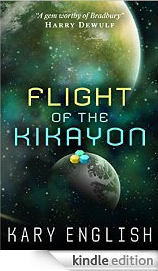
*****
Eric S Raymond
*****
Jason Cordova
Edit: I accidentally put up the wrong book for Jason Cordova at first. The publisher actually put this one on sale for today’s Book Bomb.
Kaiju Apocalypse


*****
Remember, Amazon has changed how they calculate the sales rank. There is a long delay now. We won’t see any ranking movement until this evening, and hit the highs during the night or tomorrow morning. That has turned out okay because it just gives the authors more attention later. I’ll put the initial rankings up here in a minute.
Transhuman and Subhuman: Amazon Best Sellers Rank: #174,347 Paid in Kindle Store
Riding the Red Horse: Amazon Best Sellers Rank: #43,475 Paid in Kindle Store
Wisdom from My Internet: Amazon Best Sellers Rank: #43,295 Paid in Kindle Store
Letters from Gardner: Amazon Best Sellers Rank: #1,066,078 in Books
Flight of the Kikayon: Amazon Best Sellers Rank: #1,432,174 Paid in Kindle Store
Kaiju Apoclypse: Amazon Best Sellers Rank: #315,080 in Books
——
Jagi here again. Transhuman and Subhuman made it up to 5,000 something. At one point, it looked like this:

And it even got a cute little #1 Bestseller in catagory sticker!
